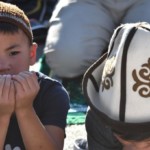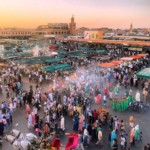Alḥamdulillāh by the permission of Allāh (subḥānahu wa taʿālā), Muslims across the world celebrated ‘Eid al-Adhā. It began on the tenth day of Dhul Hijjah in the twelfth month of the Hijri calendar (Islamic Calendar), coinciding with Sunday 11th August 2019.
According to some scholars this is the best day of the first ten days of Dhul Hijjah which are known to be the best days of the entire year. Some scholars even say that it is better than the day of ‘Arafah. The Prophet (sall Allāhu ʿalayhi wa sallam) said that:
“The greatest day in Allah’s sight is the day of sacrifice…” [1]
The Prophet (sall Allāhu ʿalayhi wa sallam) also said that it is the greatest day of Hajj, as reported by al-Tirmidhi.
‘Eid al-Adhā which translates to the “Feast of Sacrifice” is the second of the two ‘Eid’s prescribed to Muslims and also known as ‘Eid al-Akbar, the great ‘Eid. The day commemorates the willingness of Ibrahim (ʿalayhi al-Salām) to sacrifice his own son at the command of Allāh (subḥānahu wa taʿālā).
Imām Ibn al-Qayyim (Rahimahullāh) states that: “The purpose was not for Ibrahim (ʿalayhi al-Salām) to kill his son rather it was to sacrifice him in his heart so all love belonged to Allāh alone.” [2]
This presents a powerful reminder of the sacrifices that Ibrahim (ʿalayhi al-Salām) made for the sake of Allāh (subḥānahu wa taʿālā) and acts as a reminder for us that change and development requires sacrifice.
As Muslims if we are to change our state be at a personal level or our global situation we must follow in the footsteps of Ibrahim (ʿalayhi al-Salām) by submitting entirely for the sake of Allāh (subḥānahu wa taʿālā) no matter how great the cost.
Allāh (subḥānahu wa taʿālā) says in Surah Āl ʿImrān:
“Indeed, the most worthy of Ibrahim among the people are those who followed him [in submission to Allah] and this prophet, and those who believe [in his message]. And Allah is the ally of the believers.” [3]
Commenting on this āyah, prominent Islamic thinker, Syed Qutb (raḥimahu Allāhu), says:
“Ibrahim, the sūrah asserts, was a devotee to God’s true religion based on submission to God, i.e. Islam, and his natural patrons are those who adhere to that same religion. God shall be the Guardian of all true believers.” [4]
The day is marked by carrying out udhiyah which refers to the act of slaughtering an animal (a camel, cow, sheep or goat) for the sake of Allāh on the 10th of Dhul-Hijjah. In fact, ‘Eid al-Adhā, the main festival of Islām, is named as such because of this act. The word udhiyah also refers to the animal either before it is sacrificed or after it is sacrificed. [5]
Udhiyah is a very noble social act as the sunnah is to give part of it as charity, a part of it as a gift, and a part of it is to be consumed by the one sacrificing and his/her family. Some people in poor countries do not eat meat throughout the year due to its expensive nature except when they receive udhiyah.
Muslims across the globe came together at Mosques and open spaces in large numbers in order to offer the ‘Eid prayer and celebrate the occasion.
The ‘Eid also comes as Muslims across the globe travelled to Hejaz to perform the Hajj. According to the General Authority for Statistics (GASTAT), this year the total number of pilgrims reached 2,489,406 pilgrims, 1,855,027 of whom came from outside Hejaz and 634,379 from within. [6]
We pray that Allāh (subḥānahu wa taʿālā) bestows the Muslims across the globe a safe, secure and blessed ʿEid. May Allāh (subḥānahu wa taʿālā) have mercy on those who are suffering, grant them patience, victory and bring them justice in the Dunya and Ākhira, Āmīn.
[donationbanner]
Source: islam21c.com
Notes:
[1] Sunan Abi Dawud
[2] الجواب الكافي لمن سأل عن الدواء الشافي
[3] Al-Qur’ān 3:68
[4] Tafsir Fī Zilāl al-Qur’ān
[5] https://www.islam21c.com/islamic-law/3657-faq-all-about-dhul-hijjah-sacrifice-udhiyah-part-2/
[6] https://www.stats.gov.sa/sites/default/files/haj_40_en.pdf

























